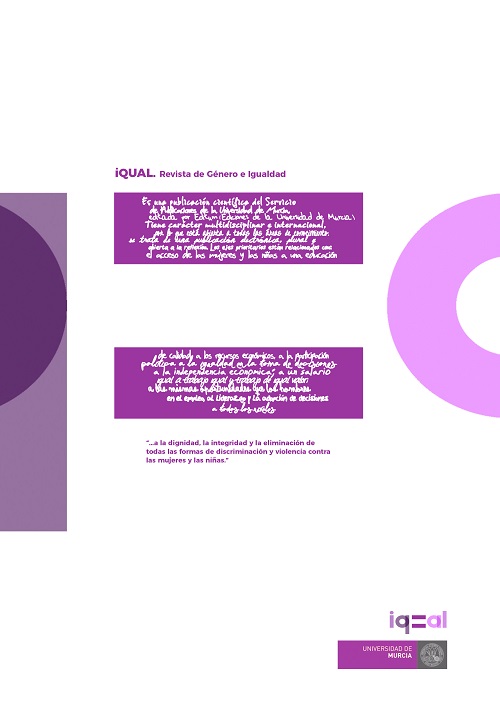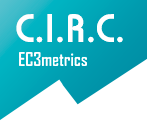Formación del profesorado en neuroeducación para promover la coeducación
Resumen
La neuroeducación es una ciencia interdisciplinar que estudia la interacción entre el cerebro, los procesos psicológicos y la educación para tratar de optimizar la enseñanza y el aprendizaje. El objetivo de este trabajo es abordar la necesidad de la formación del profesorado en neuroeducación, en base a los hallazgos científicos que justifican una educación inclusiva donde se respeten los derechos de la igualdad efectiva de mujeres y hombres. Para ello se realiza un análisis crítico, utilizando una metodología exploratoria, descriptiva y explicativa. Así, se refieren los contenidos abordados desde la neuroeducación y se advierte sobre la responsabilidad de esta disciplina a la hora transmitir los resultados científicos de forma clara y comprensible para combatir la difusión de falacias o neromitos respecto al funcionamiento cerebral. Además, se reflexiona sobre los efectos que puede tener en la educación la aceptación de perspectivas sexistas. Por último, se defiende que desde la neuroeducación se debe interpretar de forma crítica las diferencias y semejanzas en el funcionamiento cerebral de ambos sexos/géneros para fundamentar la no-discriminación y la coeducación.
Descargas
-
Resumen1749
-
Pdf1193
Citas
Amiel, J. J. y Tan, Y. S. M. (2019). Using collaborative action research to resolve prac-tical and philosophical challenges in educational neuroscience. Trends in Neu-roscience and Education, 16. https://doi.org/10.1016/j.tine.2019.100116
Aristizabal, P., Gómez-Pintado, A., Ugalde, A. I. y Lasarte, G. (2018). La mirada coeducativa en la formación del profesorado. Revista Complutense de Educa-ción, 29(1), 79-95. http://dx.doi.org/10.5209/RCED.52031
Blakemore, S. J. y Frith, U. (2007). Cómo aprende el cerebro: Las claves para la educa-ción. Ariel.
Bruer, J. T. (1997). Education and the brain: A bridge too far. Educational Researcher, 26(8), 4-16. https://doi.org/10.3102/0013189X026008004
Bruer, J. T. (2008). Building bridges in neuroeducation. En A. M. Battro, K. W. Fischer y P. J. Léna (Eds.), The Educated Brain: Essays in Neuroeducation (pp. 43-58). Cambridge University Press. https://doi.org/10.1017/CBO9780511489907.005
Bruer, J. T. (2016). Where is educational neuroscience? Educational Neuroscience, 1, 1-12. https://doi.org/10.1177/2377616115618036
Buxarrais, M. R. y Valdivielso, S. (2021). La perspectiva feminista en la educación y sus debates actuales. Teoría de la Educación. Revista Interuniversitaria, 33(2), 129-147. https://doi.org/10.14201/teri.25923
Caballero, M. y Llorent, V. J. (2022). Los efectos de un programa de formación do-cente en neuroeducación en la mejora de las competencias lectoras, matemá-ticas, sociales, emocionales y morales de estudiantes de secundaria. Un estu-dio cuasi-experimental de dos años. Revista de Psicodidáctica, 27(2), 158-167. https://doi.org/10.1016/j.psicoe.2022.04.002
Calvo, A., Susinos, T. y García, M. (2011). El largo camino hacia la coeducación un análisis de las etapas de la educación de las mujeres a partir de tres relatos de vida escolar. Revista de Educación, (354), 319-320. https://doi.org/10.4438/1988-592X-RE-2011-354-011
Carretero, R. y Nolasco, A. (2019). Sexismo y formación inicial del profesorado. Edu-car, 55(1), 293-310. https://doi.org/10.5565/rev/educar.903
Cipolla, C. y Gupta, K. (2018). Neurogenderings and neuroethics. En L. S. M. Johnson y K. S. Rommelfanger (Eds.), The Routledge handbook of neuroethics (pp. 381-393). Routledge.
Coch, D. y Daniel, D.B. (2020). Lost in translation: Educational psychologists as in-termediaries between neuroscience and education. Frontiers in Education, 5. https://doi.org/10.3389/feduc.2020.618464
Cruickshank, W. M. (1981). A new perspective in teacher education: The neuroed-ucator. Journal of Learning Disabilities, 14, 337-341. https://doi.org/10.1177/002221948101400613
Dekker, S., Lee, N.C., Howard-Jones, P. y Jolles, J. (2012). Neuromyths in education: Prevalence and predictors of misconceptions among teachers. Frontiers in Psychology, 3. https://doi.org/10.3389/fpsyg.2012.00429
Duraiappah, A., Van Atteveldt, N., Asah, S., Borst, G., Bugden, S., Buil, J.M., Ergas, O., Fraser, S., Mercier, J., Restrepo Mesa, J.F., Mizala, A., Mochizuki, Y., Okano, K., Piech, C., Pugh, K., Ramaswamy, R., Chatterjee Singh, N. y Vickers, E. (2021). The International Science and Evidence-based Education Assessment: po-sition paper (MGIEP-2021/PI/H/2). UNESCO. https://unesdoc.unesco.org/ark:/48223/pf0000375694.locale=es
Eliot, L., Ahmed, A., Khan, H. y Patel, J. (2021). Dump the ‘dimorphism’: Comprehen-sive synthesis of human brain studies reveals few male-female differences beyond size. Neuroscience and Biobehavioral Reviews, 125, 667-697. https://doi.org/10.1016/j.neubiorev.2021.02.026
Feiler, J. y Stabio, M. E. (2018). Three pillars of educational neuroscience from three decades of literature. Trends in Neuroscience and Education, 13, 17-25. https://doi.org/10.1016/j.tine.2018.11.001
Ferrero, M., Hardwicke, T. E., Konstantinidis, E. y Vadillo, M. A. (2020). The effec-tiveness of refutation texts to correct misconceptions among educators. Journal of Experimental Psychology Applied, 26, 411-421. https://doi.org/10.1037/xap0000258
Fine, C. (2008). Will working mothers’ brains explode? The popular new genre of neurosexism. Neuroethics, 1, 69-72. https://doi.org/10.1007/s12152-007-9004-2
Fine, C. (2018). Testosterona rex: Mitos sobre sexo, ciencia y sociedad. Paidós Ibérica.
García, E. (2020). Neurociencia, Humanismo y Posthumanismo. Logos. Anales del Seminario de Metafísica, 53, 9-31. https://doi.org/10.5209/asem.70833
García-Albea, J. E. (2011). Usos y abusos de lo ‘neuro’. Revista de Neurología, 52(10), 577-80. https://doi.org/10.33588/rn.5210.2010313
Gordillo, M.V. (2007). Masculinidad y feminidad: cómo educar en la diferencia. Re-vista Española de Pedagogía, 65(238), 447-458. https://revistadepedagogia.org/lxv/no-238/masculinidad-y-feminidad-como-educar-en-la-diferencia/101400009994/
Gordillo, E.G. (2017). Educación diferenciada y coeducación: continuar el debate y proteger la ciencia. Revista Española de Pedagogía, 75(267), 255-271. https://doi.org/10.22550/REP75-2-2017-05
Gracia-Calandín, J. (2020). Transhumanismo y neuroeducación en perspectiva orte-guiana. Logos. Anales del Seminario de Metafísica, 53, 55-64. http://dx.doi.org/10.5209/asem.70836
Grospietsch, F. y Mayer, J. (2019). Pre-service science teachers’ neuroscience litera-cy: Neuromyths and a professional understanding of learning and memory. Frontiers in Human Neuroscience, 13. https://doi.org/10.3389/fnhum.2019.00020
Jolles, J. y Jolles, D. D. (2021). On neuroeducation: Why and how to improve neuro-scientific literacy in educational professionals. Frontiers in Psychology, 12. https://doi.org/10.3389/fpsyg.2021.752151
Heras-Sevilla, D., Ortega-Sánchez, D. y Rubia-Avi, M. (2021). Conceptualización y reflexión sobre el género y la diversidad sexual. Perfiles Educativos, 43(173), 148-165. https://doi.org/10.22201/iisue.24486167e.2021.173.59808
Hoffman, G. y Bluhm, R. (2016). Neurosexism and neurofeminism. Philosophy Com-pass, 11(11), 716-729. http://dx.doi.org/10.1111/phc3.12357
Hughes, B., Sullivana, K.A. y Gilmore, L. (2020). Why do teachers believe educational neuromyths? Trends in Neuroscience and Education, 21. https://doi.org/10.1016/j.tine.2020.100145
Instituto de la Mujer (2008). Guía de coeducación. Síntesis sobre la Educación para la Igualdad de Oportunidades entre Mujeres y Hombres. Observatorio para la Igualdad de Oportunidades, Instituto de la Mujer.
Kim, M. y Sankey, D. (2018). Philosophy, neuroscience and pre-service teachers’ be-liefs in neuromyths: A call for remedial action. Educational Philosophy and Theory, 50(13), 1214-1227. https://doi.org/10.1080/00131857.2017.1395736
Kraus, C. (2012). Critical studies of the sexed brain: A critique of what and for whom? Neuroethics, 5(3), 247-259. https://doi.org/10.1007/s12152-011-9107-7
Lockhart, J.W. (2021). Paradigms of sex research and women in Stem. Gender and Society. http://dx.doi.org/10.1177/08912432211001384
Martínez-González, A.E., Piqueras, J.A., Delgado, B. y García-Fernández, L.M. (2018). Neuroeducación: aportaciones de la neurociencia a las competencias curricu-lares. Publicaciones, 48(2), 23-34. https://doi.org/10.30827/publicaciones.v48i2.8331
Menon, V. y Chang, H. (2021). Emerging neurodevelopmental perspectives on mathematical learning. Developmental Review, 60, 100964. https://doi.org/10.1016/j.dr.2021.100964
Mora, F. (2013). Neuroeducación. Solo se puede aprender aquello que se ama. Alianza Editorial.
Ocampo, J.C. (2019). Sobre lo “neuro” en la neuroeducación: de la psicologización a la neurologización de la escuela. Sophia: Colección de la Educación, 26(1), 141-169. https://doi.org/10.17163/soph.n26.2019.04
Organización para la Cooperación y Desarrollo Económicos (OCDE). (2002). Under-standing the Brain. The birth of a learning science. OECD Publishing.
Ortiz, T. (2018). Neurociencia en la escuela: Hervat: investigación neuroeducativa para la mejora del aprendizaje. S.M.
Painemil, M., Manquenahuel, S., Biso, P. y Muñoz, C. (2021). Creencias versus cono-cimiento en futuro profesorado. Un estudio comparado sobre neuromitos a nivel internacional. Revista Electrónica Educare, 25(1), 1-22. https://doi.org/10.15359/ree.25-1.13
Pallarés-Domínguez, D. (2021). La reflexión crítica sobre los neuromitos en la educa-ción. Teoría de la Educación. Revista Interuniversitaria, 33(2), 87-106. https://doi.org/10.14201/teri.25288
Rechlin, R. K., Splinter, T. F. L., Hodges, T. E., Albert, A. Y. y Galea, L. A. M. (2022). An analysis of neuroscience and psychiatry papers published from 2009 and 2019 outlines opportunities for increasing discovery of sex differences. Nature Communications, 13(1). https://doi.org/10.1038/s41467-022-29903-3
Reverter, S. (2021). ¿Juntos o separados? Contribución desde la neuroeducación al debate sobre la segregación sexual en la escuela. Pensamiento. Revista de Investigación e Información Filosófica, 77(Extra 295), 545-558. https://doi.org/10.14422/pen.v77.i295.y2021.009
Reverter-Bañón, S. y Medina-Vicent, M. (2018). La diferencia sexual en las neuro-ciencias y la neuroeducación. Critica-Revista Hispanoamericana de Filosofía, 50(150), 3-26. https://doi.org/10.22201/iifs.18704905e.2018.13
Rippon, G. (2020). El género y nuestros cerebros. La nueva neurociencia que rompe el mito del cerebro femenino. Galaxia Gutenberg.
Rippon, G., Eliot, L., Genon, S. y Joel, J. (2021). How hype and hyperbole distort the neuroscience of sex differences. PLoS Biology, 19(5). https://doi.org/10.1371/journal.pbio.3001253
Rippon, G., Jordan-Young, R., Kaiser, A. y Fine, C. (2014). Recommendations for sex/gender neuroimaging research: Key principles and implications for re-search design, analysis, and interpretation. Frontiers in Human Neuroscience, 8. https://doi.org/10.3389/fnhum.2014.00650
Roy, D. (2016). Neuroscience and feminist theory: A new directions essay. Signs, 41(3), 531-552. https://doi.org/10.1086/684266
Şahin, Ö. y Soylu Yalcinkaya, N. (2021). The gendered brain: Implications of exposure to neuroscience research for gender essentialist beliefs. Sex Roles, 84(9-10), 522-535. https://doi.org/10.1007/s11199-020-01181-7
Schmitz, S. y Höppner, G. (2014). Neurofeminism and feminist neurosciences: A crit-ical review of contemporary brain research. Frontiers in Human Neuroscience, 8. https://doi.org/10.3389/fnhum.2014.00546
Schwartz, M., Hinesley, V., Chang, Z. y Dubinsky, J.M. (2019). Neuroscience knowledge enriches pedagogical choices. Teaching and Teacher Education, 83, 87-98. https://doi.org/10.1016/j.tate.2019.04.002
Spets, D. S. y Slotnick, S. D. (2022). It’s time for sex in cognitive neuroscience. Cogni-tive Neuroscience, 13(1), 1-9. https://doi.org/10.1080/17588928.2021.1996343
Subirats, M. (2017). Coeducación, apuesta por la libertad. Octaedro.
Suberviola, I. (2012). Coeducación: un derecho y un deber del profesorado. Revista Electrónica Interuniversitaria de Formación del Profesorado, 15(3), 59-67.
Thomas, M., Ansari, D. y Knowland, V. (2019). Annual research review: Educational neuroscience: Progress and prospects. Journal of Child Psychology and Psychi-atry, 60(4), 477-492. https://doi.org/10.1111/jcpp.12973
Torrijos-Muelas, M., González-Víllora, S. y Bodoque-Osma, A.R. (2021). The persis-tence of the Neuromyths into educational settings: A systematic review. Fron-tiers in Psychology, 11. https://doi.org/10.3389/fpsyg.2020.591923
Organización de las Naciones Unidas para la Educación, la Ciencia y la Cultura (UNESCO). (2015). Educación 2030: Declaración de Incheon y Marco de Acción para la realización del Objetivo de Desarrollo Sostenible 4: Garantizar una educa-ción inclusiva y equitativa de calidad y promover oportunidades de aprendizaje permanente para todos. UNESCO.
Organización de las Naciones Unidas para la Educación, la Ciencia y la Cultura (UNESCO). (2019). Right to education handbook. UNESCO.
Derechos de autor 2023 Servicio de Publicaciones Universidad de Murcia

Esta obra está bajo una licencia internacional Creative Commons Atribución-NoComercial 4.0.








